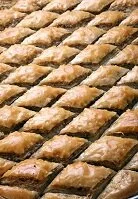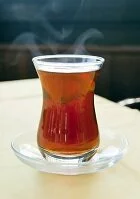Different foods in Turkey have different customs, while most foods are eaten with utensils (cutlery), some, like chicken are traditionally eaten with your hands. Others, like pork are rarely served since Turkey is primarily a Muslim country. The best route is to follow the lead of your hosts, but if eating with your hands, only bring food to your mouth with your right hand.

Baklava
If the meal is being accompanied by a beverage, never fill your own glass. Your neighbor will fill your glass and you are expected to return the favor. As you finish your plate (and finish everything on your plate), feel free to ask for more food, this is a compliment to the host. Before dessert there tends to be a break, which is often times used as a smoking break.
As the meal comes to an end the host takes the bill and everyone takes either coffee or Turkish tea, which is similar to hot apple cider. Even if you invited your guests, many Turks may consider you their guest since you're in their country; if you initiated the dinner you will have to insist on paying and may have to tell your server that you are paying or your guests will try to pay the bill. As you argue over who will pay, be careful to stop drinking your coffee or tea before reaching the bottom; these are unfiltered and have leaves or grounds on the bottom.
If dining without any locals, summon the waiter or waitress by making eye contact; waving or calling a server over can be considered rude. Tipping in Turkey is similar to much of Europe, about 10% for sit down restaurants.
Drinks

Turkish tea
The most common drink foreigners will encounter in Turkey is Turkish tea, which is similar to hot apple cider and it is offered at nearly every coffee shop. Coffee is also popular; it tends to be very strong and unfiltered though so be warned. For a more traditional drink, try ayran, which is a watered-down yogurt with salt. In addition to these, all the popular international drinks are available, including soft drinks, juices, and milk.
As a primarily Muslim country many people in Turkey don't drink alcohol, however Turkey is very liberal in this regard and most young Turks do drink alcohol, particularly in large cities along the west coast. The most popular alcoholic beverages are beer and raki, an anise-flavored alcohol. There are a number of locally produced beers with the most popular being "Efes." At many tourist locations other drinks are also widely available, including wines, hard liquors, and international beers.
There is no consensus on the cleanliness of the tap water in Turkey. Generally speaking, the tap water is safe to drink, but is heavily chlorinated, giving it a bad taste. In other areas the water quality is poor, and perhaps unsafe, so should be avoided. The best course of action is to check with locals for the cleanliness of the local water or be extra cautious and avoid the tap water entirely. If you do decide to drink the tap water, remember that many people may have troubles adjusting to the local water, as it will most certainly be different from what your system is used to.